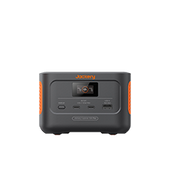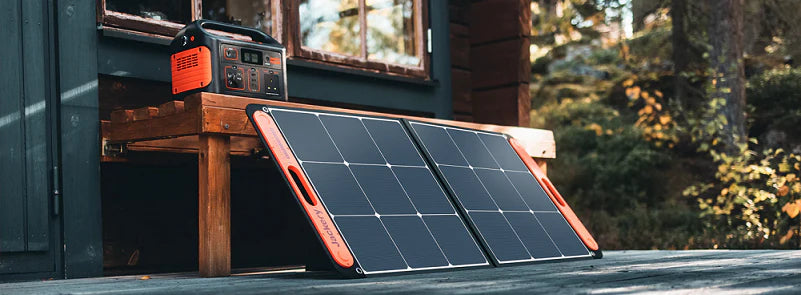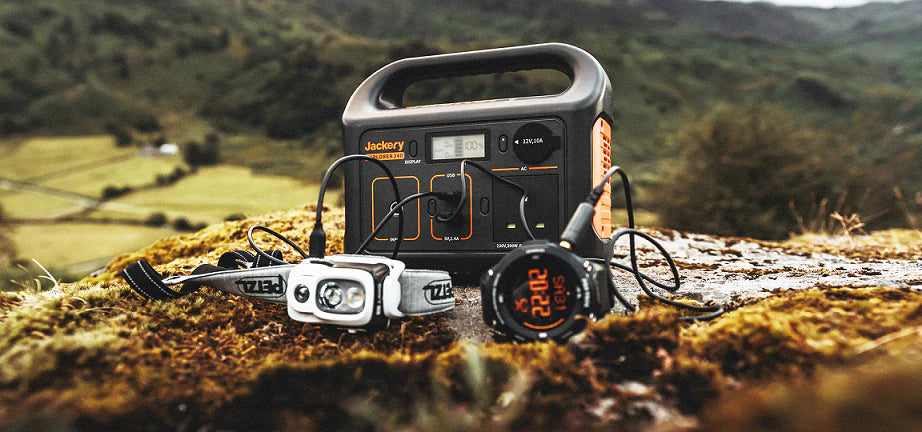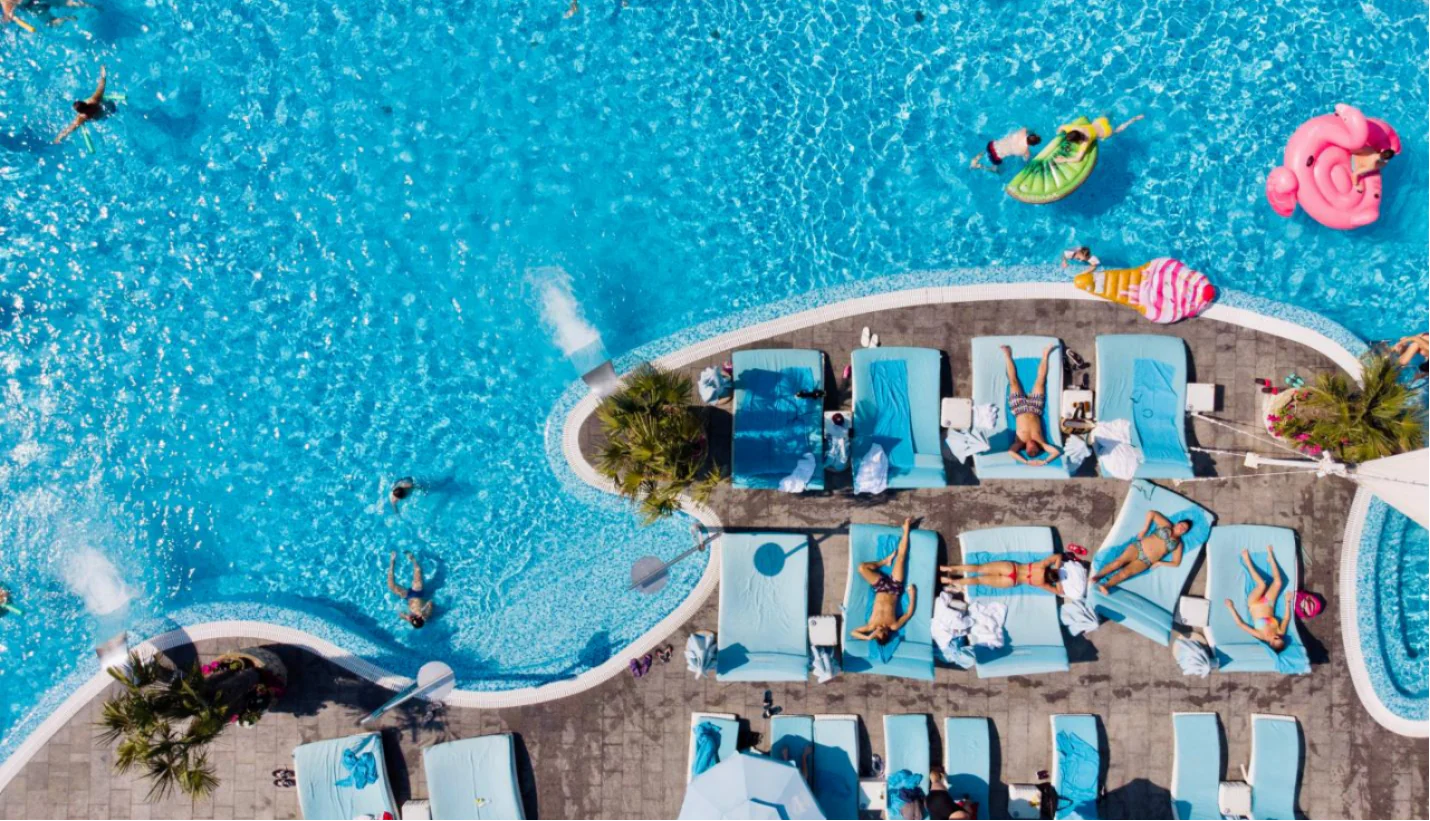In modern society, more and more people are pursuing a simple, self-sufficient lifestyle, and off-grid cottages have become their ideal choice. Living in an off-grid cottage can be away from the hustle and bustle of the city and the interference of digital devices.
It is a unique experience to return to nature and away from the hustle and bustle of the city. Whether you move to a village or transition to a more remote and sustainable off-grid cottage, this guide covers everything about living in an off-grid cottage in the UK.
Also, we highly recommend Jackery Solar Generator, a portable solar power solution, to charge your off-grid appliances with unlimited solar energy outdoors. If you worry about the bad weather conditions in the UK, the Jackery Portable Power Station can be recharged by wall sockets and carports with minimal recharging time.
|
Key Takeaways: |
|
- An off-grid cottage is self-sufficient with sustainable energy and resources. - More and more people are yearning for a return to nature lifestyle. - Electricity and water supply are often the most fundamental challenges to living in an off-grid cottage. - The eight best off-grid cottages in the UK. - To live in an off-grid cottage, you must at least solve the electricity, water, waste disposal, heating and food supply. - Living in an off-grid cottage, you can kill time by trying outdoor activities. - Considering the off-grid power supply, the Jackery Solar Generator 1000 v2 and 2000 Plus can power appliances effectively. |
What Is an Off-grid Cottage?
In recent years, with the popularity of sustainable development and the emphasis on environmental protection, off-grid cottages have become increasingly popular in the UK. In the UK, such cottages are usually built in remote rural areas or scenic spots. Off-grid cottages are not only a way of life but also a manifestation of a life attitude and environmental awareness. Generally, off-grid cottages represent a lifestyle away from the hustle and bustle of the city and returning to nature.
An off-grid cottage is a residence or resort that operates independently of traditional utilities such as electricity, water and sewage treatment systems. In other words, an off-grid cottage is self-sufficient by relying on sustainable energy and resources. In an off-grid cottage, you don't have to rely on urban electricity but can use solar panels or wind turbines. As for water, you can collect rainwater, use nearby wells, or use natural water sources.
Features of the off-grid cottage:
•Self-sufficient energy system
•Sustainable environmental design
•Location that blends into nature
•Simple and comfortable interior decoration
In short, an off-grid cottage is perfect for those who want to pursue a quiet and simple life.
Why Are Off-grid Cottages Becoming More Attractive?
In the fast-paced urban life of modern society, more and more people are beginning to yearn for a lifestyle that returns to nature. Therefore, off-grid cottages have gradually become people's ideal residences. Here are a few reasons why off-grid cottages are becoming more and more attractive:
Relax and Enjoy the Natural Beauty
Off-grid cottages allow you to escape the distractions of modern life and enjoy a more straightforward and calmer lifestyle. They are usually located in remote places with beautiful natural environments, allowing people to completely relax and experience a slow-paced life.
Self-Sufficiency
Off-grid cottages advocate a self-sufficient lifestyle. This simple lifestyle allows people to eliminate their excessive dependence on modern technology and return to the most primitive and purest state of life. By generating electricity, fetching water, and managing resources alone, they no longer rely on public utilities and are unaffected by rising utility prices or power outages.
Freedom and Independence
In an off-grid cottage, people can escape the constraints of social norms and have more time to think about life, pursue their dreams, and realise their self-worth. For example, some artists and writers choose to create in an off-grid cottage, away from the interference of the outside world.
Promoting Environmental Protection and Green Development
Off-grid cottages use renewable energy, reduce dependence on fossil fuels, and reduce carbon emissions. They also advocate a simple lifestyle, reduce resource waste, and protect the natural ecosystem to some extent.

What Challenges Does Living in an Off-grid Cottage?
Living in an off-grid cottage in the UK is a unique lifestyle promoting nature and independence. However, this choice also comes with many challenges. The following are the main challenges that may be faced by those who choose to live in an off-grid cottage.
Energy Supply
Due to their lack of access to the power grid, residents of an off-grid cottage need to solve their electricity problems. Typical solutions include solar panels, wind power, and hydropower systems. However, the power supply may not be guaranteed (as weather conditions primarily affect them).
Access to Clean Drinking Water
Off-grid cottage residents may need to rely on rainwater collection, groundwater wells or nearby water sources. Therefore, they may often face problems with poor water quality. If not correctly handled, drinking contaminated water sources can seriously threaten health.
Waste Disposal
Residents of an off-grid cottage also need to establish an effective garbage sorting and recycling system. They may also use composting and other methods to deal with organic waste. However, if waste is not handled correctly, it may pollute the environment.
Access to Daily Necessities
Living in an off-grid cottage also presents a significant problem: procuring daily necessities. The nearest supermarket or store may be far away, so residents must rely on subsistence farming or gathering to obtain food. Severe weather conditions (such as road closures caused by blizzards) may further increase the difficulty of obtaining supplies.
Medical and Emergency Services
The residents of off-grid cottages may be unable to obtain professional medical assistance in time. Therefore, they need basic first-aid knowledge and skills and may need to store enough medicines and medical supplies.
Mental Health
Although off-grid life provides opportunities for close contact with nature, isolation from society may lead to social and psychological problems. Long-term living in an off-grid cottage in a remote area will lead to a lack of communication with others, which is prone to psychological issues such as loneliness, anxiety and depression.
8 of the Best Off-grid Cottages to Stay in the UK
Off-grid cottages offer a way to escape the hustle and bustle of the city and get closer to nature. Here are eight of the best off-grid cottages in the UK, each with its characteristics, providing ideal choices for those who seek a quiet life.

1. The Lazy Duck
Location: Badanfhuarain, Nethy Bridge PH25 3ED, United Kingdom
Website: The Lazy Duck
Contact: +44 7846 291154
This six-acre off-grid retreat is in the heart of the Cairngorms National Park. From your off-grid cottage, you can walk along the Ryvoan Pass to the heart of Rothiemurchus Forest. You can get excellent wildlife viewing and photography opportunities in an off-grid cottage here.
2. The Old Coach House
Location: North Stainley, Ripon HG4 3HT, United Kingdom
Website: The Old Coach House
Contact: +44 1765 634900
The Old Coach House is on the Cornish coast, just four miles from the pretty seaside village of Looe and a one-mile walk from the nearest beach. As an off-grid cottage, it does not have Wi-Fi, but its hot water comes from solar tubes, and solar panels provide lighting.
3. Kudhva
Location: Sanding Road, Trebarwith Strand, Tintagel, Cornwall PL34 0HH, United Kingdom
Website: Kudhva
Contact: +44 7917 735244
Kudhva is an eco oasis and the perfect place to relax, read or write. Kudhva is a unique treehouse-style structure (set in tranquil woodland) set back from the ground. From Kudhva Cottage's large windows, you can enjoy views of Kudhva's woodland canopy or the Cornish coast.
4. Chaffinch Cottage
Location: Newhouse Barton Cottages, Ipplepen TQ12 5UN, United Kingdom
Website: Chaffinch Cottage
Contact: +44 7952 939309
Chaffinch Cottage is a remote cottage located 1,400 feet above sea level in Northumberland National Park. It is one of several off-grid cottages operating sustainably, using solar panels and a wind turbine to provide electricity.
5. Swinton Bivouac
Location: Masham, Ilton, Ripon HG4 4JZ, United Kingdom
Website: Swinton Bivouac
Contact: +44 1765 535020
Swinton Bivouac is a family retreat with rolling green fields, meadows, and woodland. It is ideal for families who want to escape the screens and return to nature. There is no electricity, but there are gas showers, an on-site cafe, a bar, a play area, and nature trails for the kids.
6. Shepherd's Cottage
Location: at the entrance to Loch Moidart on the West Coast of Scotland
Website: Shepherd's Cottage
Contact: 01967 431249
Shepherd's Cottage (one of three off-grid cottages) is one of nine-holiday cottages on Eileanshona Island, a 45-minute from the island's pier along the North Channel Coastal Path. The lights at Shepherd's Cottage are gas-lit. A wood-burning stove heats the heating and hot water for the bath. The water comes from a private spring (fresh peat water is filtered and safe to drink).
7. Foel Gopyn
Location: Betws-y-Coed LL24 0NF, United Kingdom
Website: Foel Gopyn
Contact: +44 344 800 2070
Located in the village of Ysbyty Ifan in Conwy, Foel Gopyn offers a complete countryside retreat (there is only countryside within a mile radius). One generator limits electricity, but a wood-burning stove provides heating in winter. It is just eight miles from Betws y Coed, which has independent shops and cafes.
8. Longstone Cottage
Location: Strawberry Ln, Mottistone, Valley PO30 4EB, United Kingdom
Website: Longstone Cottage
Contact: +44 344 800 2070
Longstone Cottage is located halfway up Mottistone Mountain on the Isle of Wight. Here, you can truly enjoy the picturesque surroundings, including exceptional views over the Longstone Valley. It offers guests a truly off-grid experience, with solar panel lighting (the only electricity supply), a cosy wood-burning stove, gas-powered cooking, and fridge appliances.
How to Live in an Off-grid Cottage?
Although life in an off-grid cottage is full of challenges, many can be overcome with adequate preparation and adaptation. But what do you need to consider to achieve self-sufficiency? Here is a detailed guide on achieving self-sufficiency in electricity, water, waste disposal, heating and food supply in an off-grid cottage in the UK.
How to Power an Off-Grid Cottage?
Providing sustainable power to an off-grid cottage requires careful consideration of renewable energy solutions. Typically, off-grid cottages rely on solar, wind and hydropower for electricity. Of these, the most popular power supply method is solar power.
• Solar power (solar panel systems)
• Wind power (small wind turbines)
• Hydropower (small hydroelectric systems)
Solar generators, like Jackery Solar Generator, can be an environmentally friendly power source to charge essential appliances with solar energy. Solar investments in electricity can benefit from various incentives, rebates, and feed-in tariffs, increasing home value while saving energy.

How to Supply Water to an Off-Grid Cottage?
Collecting and filtering rainwater is a standard water supply method for off-grid cottages, but obtaining healthy water or setting up a greywater system are also viable options. Typically, a rainwater collection system is set up in an off-grid cottage to collect and store water for drinking, cooking, watering plants and other uses.
•Rainwater collection system (including sedimentation tanks, sand filters and UV sterilisers)
•Groundwater well (drilling wells and installing pumps)
•Greywater system (returning and recycling lightly used water)
How to Deal with Waste Generated in an Off-Grid Cottage?
A less glamorous but equally important part of an off-grid cottage is waste disposal. You can often use kitchen and yard waste in a home composting system. Eventually, you can use the compost to enrich the garden soil. Septic tank systems are suitable for situations where composting toilets are not available.
•Composting toilets (regular maintenance and turning off the compost)
•Septic tank system (treated sewage can be discharged into the soil)
•Waste sorting and recycling (domestic waste should be sorted and recycled)
How to Heat an Off-Grid Cottage?
In the colder months, wood-burning stoves, biomass boilers and solar heating systems are popular options for heating off-grid cottages. Wood-burning stoves are a popular and affordable heating option for off-grid cottages in the UK (the UK has abundant forest resources). Solar heating systems are a sustainable and economical way to heat in the long run.
• Wood-burning stoves
• Biomass pellet stoves
• Solar heating systems
How to Solve the Problem of Food Supply in Off-Grid Cottages?
Many people face food shortages in off-grid cottage life. Growing vegetables and raising poultry is an essential step to achieving self-sufficiency.
First, open a small vegetable garden around the cottage (if possible) and grow some easy-to-care and short-lived vegetables, such as lettuce. In addition, raising poultry (such as chickens) is a good way to get protein.
Finally, you can prepare emergency food, such as energy bars or dried fruits, to support necessary energy at critical moments.

Jackery Solar Generators for Off-Grid Living
Investing in a solar generator for an off-grid power system is more straightforward as it operates independently of the primary grid. The intricate nature of the grid tide system necessitates that an expert conduct installation and connecting to the primary power grid.
Jackery is the preeminent supplier of solar panels, portable power stations, and solar generators. Jackery Solar Generators comprise Jackery Solar Panels and Portable Power Stations that transform solar energy into electricity. The power station's integrated inverter converts DC into AC, supplying power to indoor and outdoor devices.
Determine the energy requirements for acquiring a solar generator for your off-grid residence. Jackery Portable Power Stations possess capacities varying from 99Wh to 12 kWh, contingent upon the user's specifications. The equation for determining your device's charging duration is as follows:
Working Time = (Power Station Capacity * 0.8) / Operating Wattage of Your Device
Charging a 500W blender using a Solar Generator 2000 Plus (2042.8Wh capacity) will require 3.5 hours (2042.8Wh*0.8/500W).
Jackery Solar Generator 2000 Plus
Jackery has unveiled the Solar Generator 2000 Plus, a cutting-edge portable power solution with exceptional performance for off-grid living. Thanks to its substantial capacity and formidable power output, this device can sustain the operation of standard off-grid appliances for several weeks and fulfil all the power needs associated with outdoor adventure or professional activity.
The Jackery Solar Generator 2000 Plus allows adding extra battery packs, which boosts the capacity from 2 kWh to a remarkable 12 kWh, thus significantly enhancing the solar charging capabilities. With the ability to be expanded to 3000W, this solar product offers a 30% higher rated power than other 2 kWh solar goods available in the market.
The Explorer 2000 Plus is an industry's pioneering add-on battery pack that can be recharged using solar panels. This feature enhances versatility, improves charging efficiency, and reduces charging time. The LiFePO4 battery, with its sophisticated technology, guarantees a lifespan of 10 years, even with daily usage limited to once per day. Jackery Solar Panels generate more energy over their lifespan due to their exceptional solar conversion efficiency, reaching up to 25%.

(*The working hours are only for reference; the actual working hours depend on your usage.)
Jackery Solar Generator 1000 v2
The Jackery Solar Generator 1000 v2 is an upgraded version that is smaller, lighter, and even more robust for off-grid living in the UK. It combines Explorer 1000 v2 with SolarSaga 100W solar panel.
The Explorer 1000 v2 Portable Power Station has an impressive 1500W power output, over 50% more than earlier models. This allows for easy operation of high-demand appliances such as kettles, refrigerators, and portable air conditioners.
Equipped with USB-A/C connections and capacity for up to 100W dual PD charging, this gadget can simultaneously charge many devices, making it the ideal companion for all your power requirements.
The Emergency Charge Mode, activated via the application, enables the Explorer 1000 v2 Portable Power Station to achieve complete charging in under one hour, providing essential power backup during battery depletion. Furthermore, the ability to charge from 0% to 100% within a two-hour timeframe utilising an AC wall outlet prolongs the battery's lifespan.

(*The working hours are only for reference; the actual working hours depend on your usage.)
How to Kill Time When Living in an Off-grid Cottage?
Although living in an off-grid cottage lacks the company of modern technology, it provides a variety of ways to spend time. How can you enrich yourself and enjoy life during this quiet time? Here are some suggestions for spending time in an off-grid cottage in the UK.
Try Outdoor Activities
The off-grid cottage is surrounded by fresh air and tranquil scenery, which provides excellent conditions for outdoor activities. You can explore the surrounding forests, lakes, or hills on foot and breathe fresh air. Fishing, cycling, picnics, and camping are also good choices.
Cultivate New Bobbies
The off-grid cottage provides an ideal environment for you to focus on cultivating new interests and hobbies. You can learn painting and photography. If you are interested in music, you can learn to play guitar, piano or other instruments and enjoy the pleasure of music.
Enjoy Reading
Reading is an excellent way to pass the time in an off-grid cottage without Internet interference. You can choose to read some classic literary works or books of interest. In addition, you can also write some reading notes to express your inner emotions.
Handicraft Creation (DIY)
In an off-grid cottage, you can make daily necessities like knitting sweaters or candles and experience DIY fun. You can also learn handicrafts, such as pottery and woodworking. These activities not only exercise hands-on ability but also stimulate creativity and let you have fun in the process of making.
Learn to Cook
Cooking is also a good way to spend time living in an off-grid cottage. From simple home cooking to complex international cuisine, you can explore it. You can make delicious dishes with local ingredients or challenge yourself to learn new recipes.
Keep Moving
Even in an off-grid cottage, you can't ignore your physical health. To keep your body healthy, you can use simple equipment to do indoor exercises, such as yoga, Pilates, push-ups, etc. For example, you can do a simple yoga exercise early in the morning or evening to stretch your body and mind fully.
Meditation
Meditation is a good way to relax and improve concentration. An off-grid cottage is ideal for cultivating your body and mind. You can meditate every day to help yourself relieve stress and maintain inner peace.
In short, living in an off-grid cottage allows you to spend your time in various ways, such as trying outdoor activities, developing new hobbies, doing DIY and cooking, and staying active.
Off-Grid Cottages in The UK FAQs
The following are the frequently asked questions about the off-grid cottages in the UK.
1. What benefits will living in an off-grid cottage bring you?
Living in an off-grid cottage can bring you the following benefits:
More freedom in life
Environmental protection
Promote mental health
Improve physical health
Learn more skills
2. Who is an off-grid cottage suitable for?
Off-grid cottages are usually suitable for the following people:
People who pursue an environmentally friendly lifestyle
People who like solitude and nature
Outdoor enthusiasts/adventurers
3. Is living in an off-grid cottage cost-effective?
Living in an off-grid cottage can be cost-effective from a long-term investment perspective if done correctly. While installing renewable energy sources such as solar panels or building a composting toilet/water collection system may have an initial cost, these investments will pay for themselves quickly over time through reduced water and electricity bills. However, an off-grid cottage is not cost-effective if you rely highly on modern living facilities.
4. Can you live in an off-grid cottage permanently?
In the UK, living permanently in an off-grid cottage is possible. However, it requires more preparation and planning than a more traditional house. In addition, the structure and facilities of the off-grid cottage must meet safety standards, including fire prevention, ventilation, and sanitary facilities. Most importantly, residents should be fully prepared for off-grid living to ensure sustainability and cope with possible challenges.
Final Thoughts
An off-grid cottage can also allow you to enjoy the beauty of nature, have more privacy, and experience a sense of freedom that is difficult to find in densely populated areas. However, although life in an off-grid cottage may seem peaceful and tranquil, there are many challenges in actually living in it. Therefore, before deciding to live in an off-grid cottage, you must thoroughly assess your abilities and needs and make comprehensive preparations.






























































































